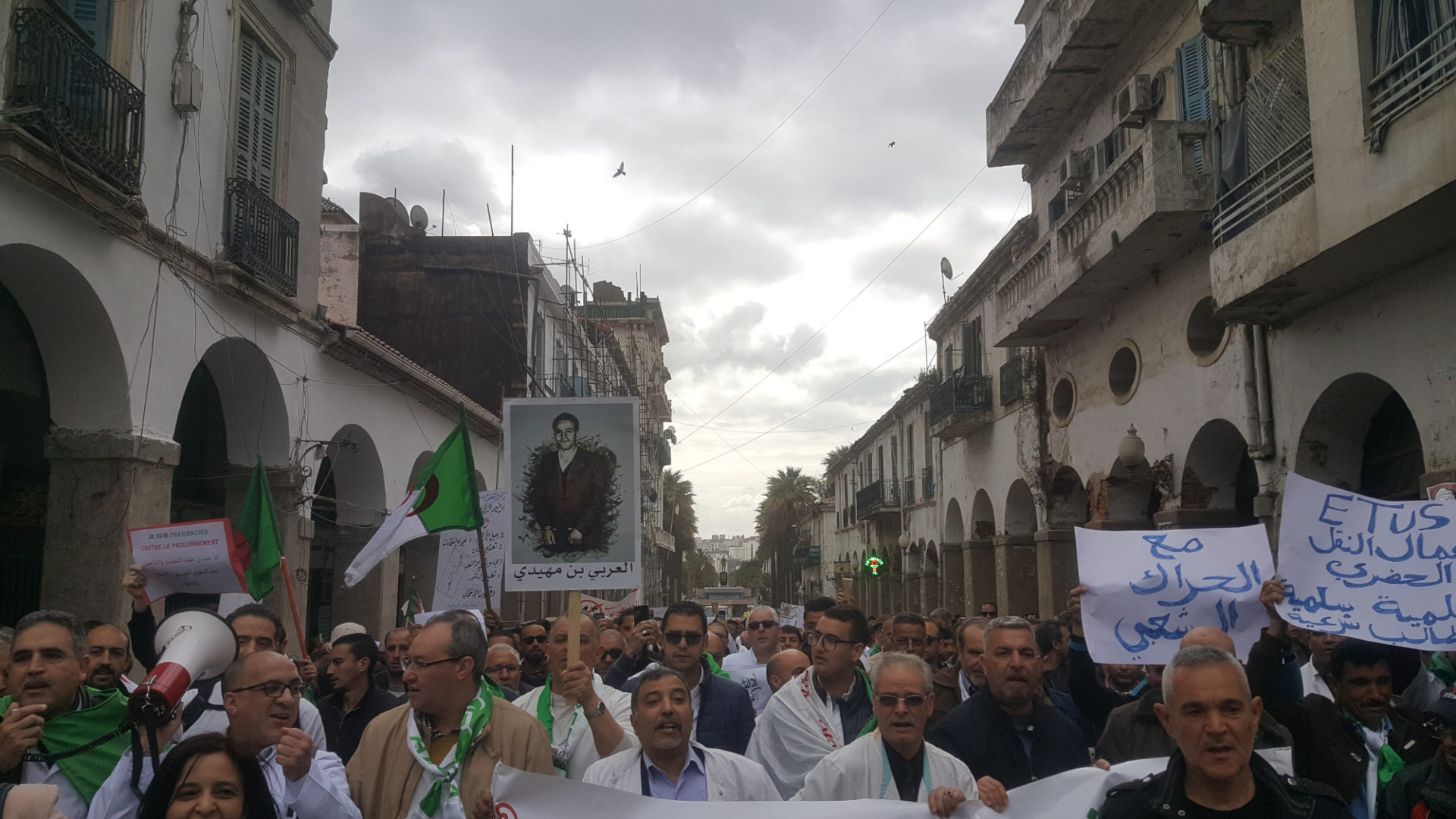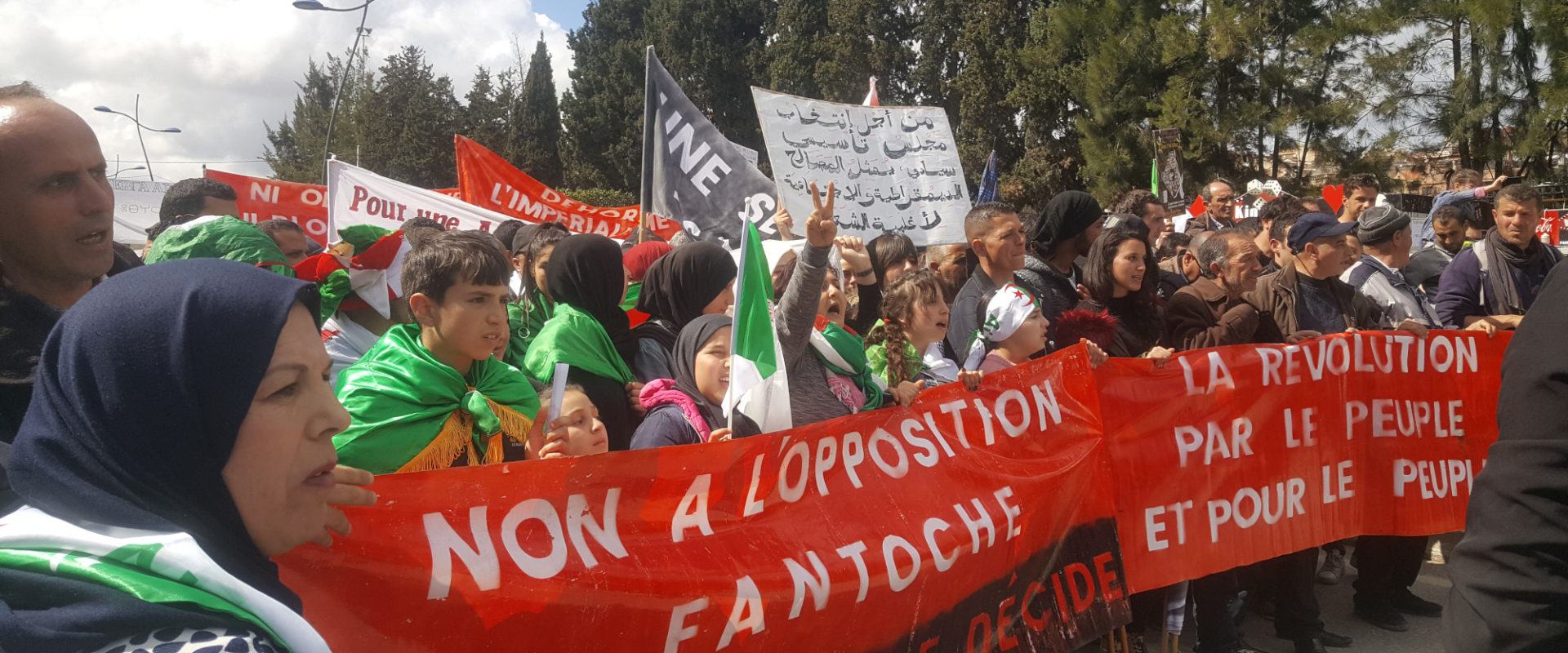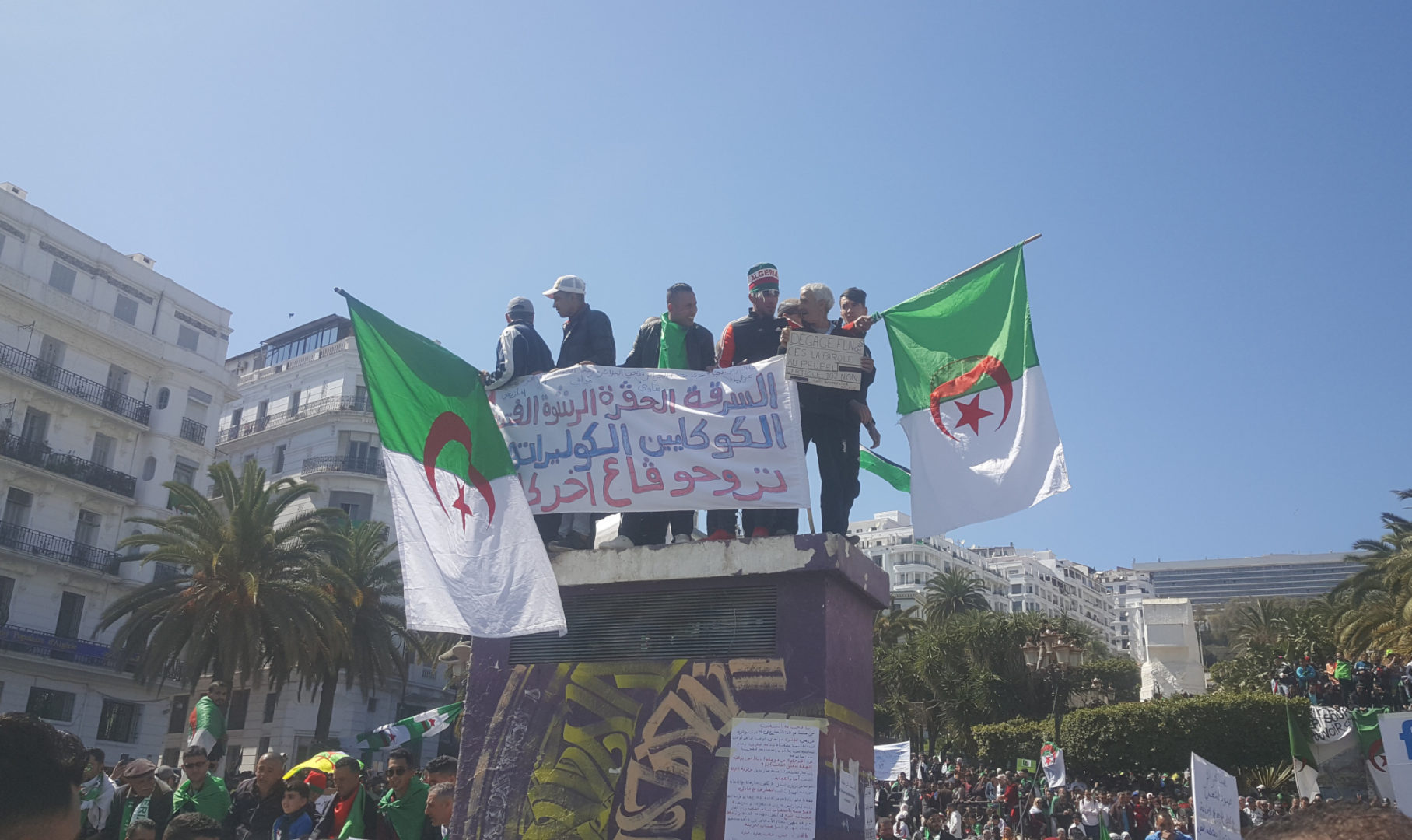What makes this movement really unique is its massive scale, peaceful character and national spread, including the marginalized south. The movement is also characterized by a significant participation of women and especially young people, who constitute the majority of the population. Algeria has not witnessed such a broad, diverse and widespread movement since 1962, when Algerians went to the streets to celebrate their hard-won independence from French colonial rule.
by Hamza Hamouchene
April 8, 2019
source: Roar
ٌٌWhat is happening in Algeria is truly historic. The people won the first battle in their struggle to radically overhaul the system. AbdelazizBouteflika, president for the past twenty years, was forced to abdicate after more than six weeks of street protests and a re-configuration of alliances within the ruling classes.
Since Friday, February 22, millions of people, young and old, men and women from different social classes have taken to the streets in a momentous uprising, re-appropriating long-confiscated public space. Historic Friday marches followed by protests in several sectors (education, health, petrochemical industry, students, etc) united people in their rejection of the ruling system and their demands of radical democratic change.
The two emblematic slogans of this peaceful uprising — “They must all go!” and “The country is ours and we’ll do what we wish” — symbolize the radical evolution of this popular movement that was triggered by the octogenarian president’s announcement to run for a fifth term despite dealing with serious health issues; Bouteflika has not addressed the nation for nearly six years.
What makes this movement really unique is its massive scale, peaceful character and national spread, including the marginalized south. The movement is also characterized by a significant participation of women and especially young people, who constitute the majority of the population. Algeria has not witnessed such a broad, diverse and widespread movement since 1962, when Algerians went to the streets to celebrate their hard-won independence from French colonial rule.
The uprising caught many by surprise. In early February, the political mood was still that of despair and resignation at what the authorities were preparing to do with the presidential elections scheduled for April 2019. The generally arid political landscape resulted from the decimation of a genuine political opposition within the country coupled with the repression and/or co-optation of trade unions and other such civil society actors.
The popular mass protests starting from late February, however, upturned this status quo and created huge potential for change and resistance. When chanting “We woke up and you will pay!” the people are expressing their newly-discovered political will. The liberatory process is at the same time a transformative one. We can witness this in the euphoria, energy, creativity, confidence, wit, humor and joy that this movement has inspired after decades of social and political suppression.
This revolution is like a breath of fresh air. The people have affirmed their role as agents of their own destiny. Following Fanon, it illustrates how, in the midst of the worst disasters, the masses find the means of reorganizing themselves and continue their existence when they have a common objective of getting rid of their oppressors and emancipating themselves.
DOMESTIC PEACE, INTERNATIONAL ACQUIESCENCE
This decisive awakening on the part of the people and their growing political awareness are harbingers of good things to come and of the stormy days ahead for the profiteering caste and their foreign backers who have been scandalously enriching themselves. In the midst of increasing pauperization, unemployment, paralyzing austerity, the pillaging of resources, uneven development and corruption, the rationality of the current revolt and rebellion becomes absolutely clear.
First of all, it is important to note that this eruption of popular anger is the result of an accumulation of struggles and acts of resistance that date back to the ‘80s, the most recent examples being the anti-shale gas uprising of 2015 and the unemployed movement since 2012 in the Algerian Sahara.
The Algerian uprising should also be analyzed within the context of a protracted revolutionary process that has swept across the Arab region in the last decade, starting from Tunisia and spreading to Egypt and a dozen other countries. Obviously, this process has been fraught with contradictions and has seen ups and downs, gains and setbacks, which materialized in a liberal democratic transition in Tunisia and bloody counter-revolutions and imperialist interventions in the remaining countries that have witnessed these uprisings.

Protest in Algiers on Friday, March 15. Image by Hamza Hamouchene
Nine years ago, Algeria seemed to be immune to this revolutionary fever and was viewed as the exception to the rule, despite harboring the same set of conditions for revolt. At the time, the government suggested that Algeria already had its “spring” over two decades earlier, referring to the short-lived democratic transition following weeks of demonstrations in October 1988 that forced the regime to give way to political pluralism and an independent press. However, these gains in civil liberties and the “democratic transition” were aborted by the military coup and the civil war of the 1990s.
In addition to ongoing forms of repression, collective memories of hundreds of thousands of deaths and brutal state violence underpinning the eradication of the Islamist opposition may help explain the failure of an uprising to take root in Algeria during the 2010-2011 period. The spectre of the civil war and the fear of bloody violence have been further exacerbated by the intervention in Libya, the counter-revolution in Egypt and the carnage and foreign interference in Syria.
Additionally, oil and gas revenues — which prices peaked in the late 2000s — were used to purchase social peace domestically and to secure international acquiescence. Domestically, the hydrocarbon bonanza was used to pacify the population and prevent the intensification of popular anger. Externally, by virtue of being the third largest provider of natural gas to Europe after Russia and Norway, and given the dwindling production in the North Sea and the Ukrainian crisis, Algeria hoped it could leverage this position to play an even more important role in securing Europe’s energy supplies, and by extension Western collusion and approval.
These factors do no longer constitute a brake on people’s desire for meaningful change as popular discontent from below converged with a deep crisis within the ruling classes leading to the indignation of the oppressed to burst forth and find its expression in the streets.
A POLITICAL CRISIS AND INTERNAL POWER STRUGGLES
Algeria has been undergoing an acute multi-dimensional crisis for some time now. The country has been experiencing a political crisis for decades — in particular since the 1992 military coup and the ensuing brutal civil war. The origins of this crisis date back to the colonial era, though its most recent manifestations are the direct result of the politics of a parasitic accumulation and entrenched corruption: a militaro-oligarchic nexus that denies the Algerian people their right to self-determination and dispenses with popular legitimacy for the benefit of domestic and international capital.
This crisis has been exacerbated by several factors, not in the least by the ailing Bouteflika’s general absence from the political stage. The crisis has been compounded by intra-elite power struggles, culminating in the fall of Algeria’s long-term king maker, the Military Intelligence Agency (DRS) Chief in 2015 and the cocaine scandal of 2018, which led to the sacking of the head of police, a few generals and other high functionaries in the Ministry of Defense.
In a context of the failure of the institutionalized opposition and social movements to articulate and carry out a viable alternative, we predicted in 2016that
the slump in oil prices may just hammer the final nail in the coffin of a rentier, non-productive and de-industrialized economy that is highly dependent on oil and gas exports, the main source of foreign currency…..With the oil prices plummeting and with foreign currency reserves (estimated at $179 billion at the end of 2014) deemed to not last beyond 2016-2017, the 1988 experience could easily be replicated and the crisis has the potential to escalate into a full explosion that will threaten the country’s national security and possibly its territorial integrity.
The recent events come at a time of an acute economic crisis characterized by crippling austerity measures following the decline of oil and gas export revenues, coupled with an intensification of infighting and divisions within the ruling elites after the imposition of the candidacy of Bouteflika for a fifth term at the helm of the state.

March by the medical staff in the streets of Skikda in support of the popular movement, eastern Algeria on March 19, 2019. Image by Hamza Hamouchene
The triad of power consisting of the presidency, military intelligence (DRS) and the armed forces’ high command showed its first signs of weakness in 2008 when the DRS started clashing with the two other centers of power. In 2019 the split was complete, when the decisive entrance of the people unto the political stage effectively forced the armed forces’ high command to distance itself from the presidency. The military clearly intervened to put an end to Bouteflika’s reign in order to safeguard the regime in place.
Such public displays of rivalry and dispute are symptomatic of the deep-seated contradictions and instability of the current ruling block and the crisis of hegemony within it, which has opened up new spaces for resistance.
This is a significant moment in the popular dynamic that started in February 2019 as this is only one victory in the long struggle for radical change that must include the overthrow of Major General Gaid Salah too; a key loyal figure in Bouteflika’s regime and a supporter of his fifth term before backtracking under the pressure of the growing popular movement. The army leadership is definitely not to be trusted, as was made clear by Major General Salah’s initial threats towards movement before adopting a more conciliatory tone. The Algerian people need to be more vigilant and determined than ever in order to halt the counter-revolutionary forces from hijacking this historic uprising.
Now that Bouteflika resigned, it is absolutely necessary to implement a truly democratic transition, and the people should not yield to calls for applying article 102 of the constitution, which would allow the leader of the upper house to take over and to organize elections in 90 days after the presidency has been declared vacant by the constitutional council (as the incumbent is too ill to exercise his functions).
Basically, if applied to the letter, this will keep the current system in place and will not guarantee free and transparent elections. The people are asking for popular sovereignty which cannot be curtailed by rigid legalistic and constitutionalist arguments. This is a unique moment in Algeria’s history to impose a new revolutionary paradigm, which go beyond legal and constitutional frameworks in order to radically challenge the status quo and create a fundamental break with the oppressive system in place.
There are already several proposals to resolve the crisis and to initiate a kind of a transition that will satisfy peoples’ demands and give them back their stifled sovereignty. The army command must not interfere with this process and must stick to its constitutional role of guaranteeing national security. Algerians did not revolt to replace some oppressors with others.
For this reason, the balance of forces must be shifted significantly towards the masses by maintaining the resistance (marches, occupations of public spaces, general strikes, etc) to force the army command to yield to people’s demand for system change entailing the removal of the entire old political guard.

UNDERLYING ECONOMIC CAUSES
The economic crisis that lies at the heart of the current revolt, has been long in the making. By the mid 1980s, Algeria’s nationalist development program of the ‘60s and ‘70s was deemed to be a failure and the attempt to disconnect from the global capitalist system was halted and replaced by a market economy. Similar to processes occurring elsewhere in the region, this new orientation entailed the de-industrialization of the economy, the dismantlement and privatization of public companies, deregulation and other forms of neoliberal restructuring. As a result, a military-private bourgeoisie nexus took the lead in shaping Algeria’s socio-economic agenda in line with the globally dominant neoliberal doctrine.
In the 1990s, the Algerian experience was not only one of horrific civil war but also of forced economic liberalizations dictated by the International Monetary Fund (IMF) and the World Bank. It was Algeria’s turn to experiment with the “Shock Doctrine” by introducing painful and extremely controversial policies. A course that entailed the break-up of state-owned companies, borrowing from the IMF, the initiation of the import-import bazaar economy, not to mention the subjugation of the Algerian people to harsh austerity measures and further surrendering national sovereignty.
This process of re-linking the national economy to international capital resulted in the compradorisation of the ruling elites by aligning their interests and subordinating national ones to those of international capital. Yet, by the end of the 90s, Algeria’s excesses led to its diplomatic isolation.

The Bush administration’s declaration of a “global war on terror” following the 9/11 attacks provided a perfect opportunity for the Algerian ruling classes to garner renewed Western — and especially American — backing. In late 2002, president Bouteflika penned a letter, titled “A Friend in Algeria”, which was published in the Washington Times. In it, he pledged full intelligence cooperation and energy security to the United States. In a nutshell, over the two decades following the 1992 coup d’état, the Algerian regime’s reliance on external — as opposed to popular — legitimacy and support became the modus operandi.
We cannot fully appreciate the political situation in Algeria without scrutinizing foreign influence and interference and apprehending the economic question from the angle of natural resource grabs and energy (neo)colonialism. This includes the enormous concessions made to multinationals and the pressures coming from outside to execute further liberalization in order to remove all restrictions to international capital and fully integrate Algeria into the global economy in a totally subordinate position.
The attempts to finalize a new hydrocarbon law in 2019 that will be friendlier to multinationals and which offers more incentives (read concessions) for them to invest epitomize this tendency and opens the way to destructive projects such as exploitation of shale gas in the Sahara and offshore resources in the Mediterranean.
TOWARDS A TRUE DEMOCRATIC TRANSITION?
If Algeria continues on this path of liberalization and privatization, we will definitely see more explosions of popular unrest and discontent as a social consensus cannot be achieved while pauperization, unemployment and inequality continue. If maintained, the neoliberal policies will block the democratization process in Algeria and will end up reinforcing an authoritarian regime with a democratic façade.
The primacy of the socio-economic question has been demonstrated by the Tunisian experience: a neoliberal “democratic” transition that has not resolved any of the problems that led to the revolution. It was rather a dynamic process that crushed the revolutionary spirit of the people.

Banner reads: “Theft, humiliation, embezzlement, corruption, cocaine, cholera..You must all go.” Picture taken in Algiers on Friday, March 29, 2019. Image by Hamza Hamouchene
Democracy means the sovereignty of the people and cannot be reduced to mere electoralism. Genuine democracy can only be constructed when it is opposed to imperialism and its local lackeys in the comprador bourgeoisie, as well as to neoliberal capitalism and its dispossessing policies. In order to achieve genuine national independence, social justice and true democracy, we cannot separate the democratic (anti-authoritarian), social (anti-capitalist) and anti-imperialist struggles.
The latter dimension has been reasserted by a staunch hostility to any foreign interferences by the Algerian people. They strongly rejected French complicity with the ruling factions and disapproved of attempts by the former Foreign Minister Ramtane Lamamra to internationalize the conflict through his trips to US, Europe, Russia and China.
Following this, it becomes clear that any transition that will not address questions of social and economic justice as well as national and popular sovereignty on natural resources will be vacuous and will sow the seeds of future revolts and uprisings. We will definitely do better than continuing to implement more of the disastrous economic policies that led the people to rise up and revolt in the first place.
After Bouteflika’s abdication a new chapter has begun in the Algerian uprising; a chapter where organizations and intellectuals who are highly conscious and armed with revolutionary principles ought to bar the way to the rule of the military and the comprador oligarchy. Slogans such as “The army and the people are brothers” cannot be applied to the corrupt generals that benefited from and upheld Bouteflika’s rule.
The Algerian people — especially the popular masses — need to be wary of the interventionism of such actors in order to avoid a scenario à la Sisi in Egypt. There too, Sisi claimed that he intervened on behalf of the people when he executed a coup against Morsi and we all know what happened after. It could be tactical to profit from the ongoing internal power struggle among the ruling elites, but it would be a fatal mistake to believe that the leadership of the army would be on the side of the people or their revolut
At this time, the organic revolutionary intellectuals and opposition leaders and activists need to assume their historic role of engaging and thinking with the masses, educating them politically, organizing them and taking their demands forward. In this respect, autonomous trade unions, students committees, unemployed people’s organizations can play an important role mobilizing people and channeling their anger.
Some in Algeria are calling for a three to six months transitional period. This must be rejected as we need not to rush. Enough time must be given to the masses to organize themselves locally and for representatives and leaders to emerge organically in order to fully participate in the construction of a radical democracy.
Confrontation is at the heart of every revolutionary practice, so instead of avoiding it, it is better to prepare and keep organizing and multiplying spaces for debate and reflection on true democratic alternatives to the current exploitative and authoritarian status quo. The masses must continue to mobilize and to reject any foreign intervention. In order not to miss this historic opportunity, the democratic transition has to take place upon the initiative and under the guidance of the people.
Hamza Hamouchene

Hamza Hamouchene is an Algerian researcher, activist and commentator. He is the coordinator of Environmental Justice North Africa (EJNA) and co-founder of Algeria Solidarity Campaign (ASC).
GREEK TRANSLATION:
